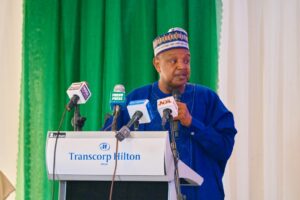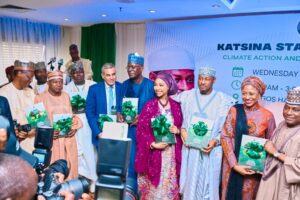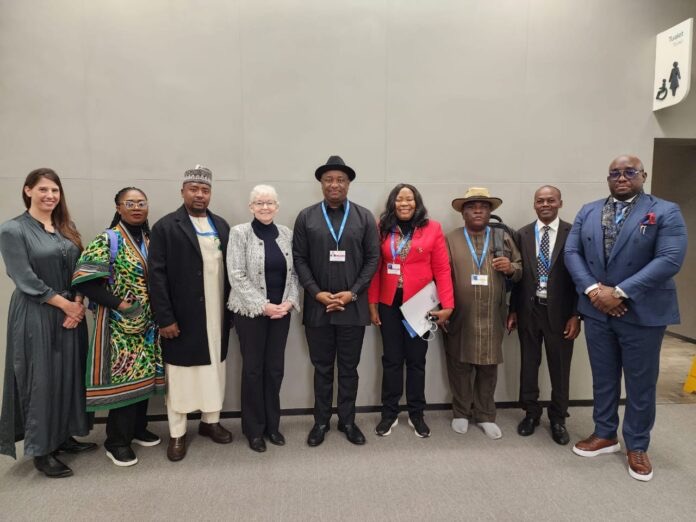1,144 total views today
By Ijeoma Olorunfemi
The American Geophysical Union (AGU) has unveiled an ethical framework to guide countries, world leaders and institutions on responsible decision making and inclusive dialogue towards addressing climate change and global warming.
The report tagged “Ethical Framework Principles for Climate Intervention Research” was signed by Mr Josh Weinberg, Vice-President, Strategic Communications and Marketing, AGU, and made available to the News Agency of Nigeria (NAN) on Tuesday in Abuja.
With contributions from a global panel of earth and space scientists, the report re-emphasised geo-engineering as a strategy for addressing global warming.
It stated that any research into large-scale interventions in earth’s climate system must be grounded in sound ethical principles for the society to make informed choices⁰.
“The framework seeks to establish a set of globally recognised ethical principles to guide research, funding and policy proposals and precedents developed to guide research around other emerging fields with unknown consequences.
“Such consequences include ethical practices for biomedical research and genetic engineering.’’
The report recalled the 2015 UN Paris Agreement, where nations across the world pledged to pursue efforts to limit global temperature rise to 1.5 degrees Celsius.
It decried that global emissions were still increasing and every additional fraction of a degree would see more severe storms, floods, heatwaves while other climate impacts would increase the risk of triggering catastrophic tipping points.
“Climate interventions, also known as geo-engineering or climate engineering, are deliberate, large-scale attempts to alter the climate system in a way that halts, slows down or reverses global warming.
“Climate intervention technologies and methods include carbon dioxide removal, aiming to remove greenhouse gases from the atmosphere and store them, using approaches like reforestation or increasing the ocean’s capacity to absorb carbon.
“There should be solar radiation modification, which aims to reduce the amount of solar radiation absorbed by earth, such as approaches that increase the amount of sunlight reflected from clouds or space sunshades.
“Interventions should include emerging technologies and research, including those aiming to preserve ice sheets and restore sea ice and permafrost,’’ it said.
The framework had been developed over a two-year period, under the guidance of an advisory board of more than 40 international experts from a wide range of disciplines, with extensive public consultation worldwide.
It proposed that all new research plans, funding decisions and policy proposals should meet five key principles, which included responsible research, holistic climate justice, inclusive public participation, transparency and informed governance.
The framework applied to all types of climate intervention and covers lab research and computer modeling as well as activities undertaken in the field.
It was designed to be flexible enough to be adapted to the needs of diverse contexts, actors and capable of evolving as society’s understanding of climate risks and climate intervention technologies.
“AGU intends for the framework to drive discussion within the broader community involved in and affected by climate intervention research, policy, investment, prompt the development of norms for ethical and responsible research practices.
“AGU and the contributors of this work strongly encourage all relevant actors, including researchers, funders and policymakers, to embrace these ethical principles when considering or undertaking activities relating to climate intervention research,” says the report.
Prof. Lisa Graumlich, AGU’s President, said that climate change required immediate action; and most urgent, non-negotiable priority must be to tackle carbon emissions as its root cause.
“As pressure grows to supplement emissions reductions with active, large-scale intervention in Earth’s climate system, let us ensure research is done in inclusive ways, representative and just, carefully considering risks and benefits,” he said.
According to Prof. Carlos Nobre, Ethical Framework Advisory Board member, all live on one planet, but solutions cannot be one size for all.
Nobre said that global communities had unique challenges and vulnerabilities.
He said in addressing the existential threat of climate change, it was imperative that it was done by centering ethics.
“This framework helps lay the foundation for effective collaboration and partnership,’’ Nobre said.
Prof. Billy Williams, AGU’s Executive Vice President, Diversity, Equity and Inclusion, stated that communities needed to be heard on decisions that affected them.
Williams said though climate change was a risk shared by all Earth’s people, the weight of climate consequences was not carried equally.
“As we consider technology to counteract warming, it is essential that we do not add to that unequal burden,” he said.
Janice Lachance, Interim Executive Director of AGU, said that climate intervention must not replace greenhouse gas emissions reduction.
He said there were robust discussions and debates on whether climate intervention should become part of a comprehensive strategy to slow warming.
“The discussions should address legacy carbon emitted over the last century and get the globe back on track with global temperature targets.
“It is AGU’s privilege and responsibility as a leader in climate science to advocate for responsible pursuit of knowledge,” he said.
AGU is a global community supporting more than half a million advocates and professionals in earth and space sciences.
Through broad and inclusive partnerships, AGU aims to advance discovery and solution science that accelerate knowledge and create solutions that are ethical, unbiased and respectful of communities and their values. (NAN)(www.nannews.ng)
Edited by Chijioke Okoronkwo





 Malam Balarabe Lawal, Minister of Environment, noted that the climate crisis is no longer a distant threat.
Malam Balarabe Lawal, Minister of Environment, noted that the climate crisis is no longer a distant threat. Ms Amina Mohammed, Deputy Secretary-General of the UN, in her keynote address, pledged to support the state in its green economy initiatives.
Ms Amina Mohammed, Deputy Secretary-General of the UN, in her keynote address, pledged to support the state in its green economy initiatives.






